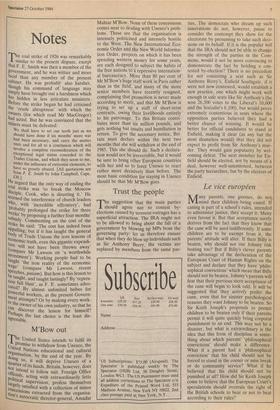Notes
The coal strike of 1926 was remarkably similar to the present dispute, except that F. E. Smith was then a member of the government, and he was wittier and more lucid than any member of the present cabinet. He was probabl' also harsher, though his command of language may simply have brought out a harshness which lies hidden in less articulate ministers. Before the strike began he had criticised the 'crude abruptness' with which the owners (for which read Mr MacGregor) had acted. But he was convinced that the miners must be defeated: We shall have to set our teeth just as we should have done if six months' more war had been necessary, and carry the matter once and for all to a conclusion which will Involve a complete reconsideration of the exceptional legal status conceded to the Trades Unions, and which they seem to me, under the influence of extremist elements, to have so grossly abused. [All quotations are from F. E. Smith by John Campbell, Cape, £30.] He argued that the only way of ending the coal strike was `to break the Moscow d1seiple, Cook, who is directing it.' He scorned the interference of church leaders Who, with 'incredible effrontery', had Probably prolonged the strike for three weeks' by proposing a further four months' subsidy. Commenting on the cost of the strike he said: 'The cost has indeed been aPPalling; but if it has taught the general b°dY of Trade Unions the iron lessons of economic truth, even this gigantic expendi- ture will not have been thrown away' (compare Mr Lawson on 'a worthwhile Investment'). Working people had to be taught `the iron reality of the economic Wage' (compare Mr Lawson, recent speeches, passim). But how is this lesson to be taught, and taught lastingly? By 'repres- sion full 11 blast', as F. E. sometimes advo- cated? By almost unlimited bribes for Powerful workers, as the present Govern- ment attempts? Or by making every work- er the owner of his own industry, so that he can discover the lesson for himself? Perhaps the last choice is the least dis- agreeable.


















































 Previous page
Previous page